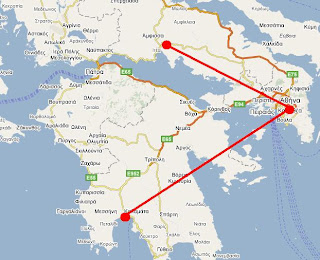As is now the custom here, here's another Google Maps image of where I got to while I was there.

I started off by flying to Athens via Zurich, spending a few days there and taking a day trip to the ancient town of Delphi, before catching a coach down to Kalamata to visit Cecily, a good friend from Selwyn, who as a linguist is taking her year abroad there, and who was kind enough to put me up!
I shall post on each place separately, but thought I'd start out with a special post on something that stood out right away and successfully foxed me throughout my stay - the Greek language.
As soon as I got off the plane I realised that I was in trouble. Usually it's possible to at least have a stab at translating a foreign word, and sometimes you might even be able to try pronouncing it. Not in Greece. Take the following sign for example.

Not only do none of the English translations look anything like their Greek counterparts, but I've not the foggiest as to how to even start pronouncing them in Greek. And personally I thought that was great, if slightly awkward. It's easy to assume the western alphabet to be universal, but of course it's not, and it was odd finding myself in a place where, for the first time, I hadn't a clue what I was reading and again realised that English will only get you so far.
It was therefore great visiting Cecily who speaks Greek and who helped me through the fog. Perhaps the funniest moment though occured in her absence, when a group of Greek students whom I had my back to tried to catch my attention - in Greek. Of course, I had no idea that they were talking to me, so I paid them no attention, but the Greek continued until one of them tried 'Hellooo?', at which point I twigged and simultaneously gave away my English ignorance. I'm still not quite sure what they wanted, but I hope they've now got it!
There's something quite special about the Greek alphabet. Taking A-Levels maths means that I always associate it first with mathematics, and secondly with history, - I don't think I'd really appreciated before that it's still in use today. There's something quite surreal about seeing 'ancient' Greek letters like 'Ω', 'Φ', 'ω' and 'μ' used in something as modern as graffiti! To a lay person it was quite surprising that, given the variation in the alphabet, spoken Greek actually didn't sound dissimilar to Spanish. After hearing Fajar speak Arabic while in Washington, I'd expected a language with a different alphabet to sound different too, but it sounded so Spanish that when they made the Greek announcement on the flight down my first thought was to question why they were making a Spanish announcement on a flight to Greece. The penny of course eventually dropped.
Greece also provided perhaps two of the best English translations I've seen so far in the following two signs (which were actually back-to-back).


I particularly liked the 'ashes are painful' one. But as ever I'm cautious to poke fun, at least someone was able to try and translate, which is more than I think I'll ever be able to do.
No comments:
Post a Comment